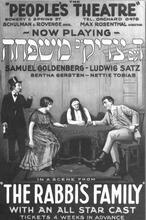Judith Malina
Judith Malina won acclaim as an actress, director, and producer through the experimental Living Theatre she co-founded with her husband, Julian Beck, in 1948. Malina was praised for her avant-garde, political approach to directing. The Living Theatre toured the United States and France and performed street theater in Brazil before the company was expelled as incendiary. Malina used the theater for political awareness and action and advocated for the antiwar movement, Women Strike for Peace, and the Industrial Workers of the World. Malina also performed as an actress, wrote poetry, and taught at NYU and Columbia University. She received many honors for her work, including an Obie Award, the Paris Critics Circle medallion, and a Guggenheim Fellowship, and was inducted into the Theatre Hall of Fame in 2004.
Early Life and Family
Born on June 4, 1926, in Kiel, Germany, to Polish Jewish parents Rabbi Max Malina and Rosel Zamora, an aspiring actress, Judith immigrated to New York with her parents in 1928. At age seven she appeared at an anti-Nazi rally in Madison Square Garden and shortly after wrote her first poem, for Manhattan’s Central Synagogue. By 1938, she was helping her father send pamphlets to Germany, asking, “Do You Know What Has Happened to Your Jewish Neighbors?” She was naturalized in 1944. Throughout her life, the influence of her family’s cultural and religious beliefs continued. Often her diary records the Jewish holidays on which activities took place.
Dropping out of high school when her father died in 1940, Malina met and began her association with Beck, held various unskilled jobs, and studied acting and directing with Erwin Piscator at the New School for Social Research, debuting as an actress in August 1945. In April of 1948, she and Beck, to whom she was married from October 30, 1948, until his death in 1985, incorporated the Living Theatre, which eventually produced more than seventy-five plays. Their son, Garrick Maxwell, who became a gem and mineral dealer, was born on February 17, 1949. Her daughter, Isha [sic] (from Genesis “and she shall be called woman”), who later acted with the Living, was born on July 19, 1967. Among her critically acclaimed presentations at the Cherry Lane Theater were Pirandello’s Tonight We Improvise, Gertrude Stein’s Dr. Faustus Lights the Lights, and the premiere of William Carlos Williams’s Many Loves.
Career and Awards
The Living Theatre eventually settled in its own Fourteenth Street loft. Malina was profoundly influenced by M.C. Richards' English translation of Antonin Artaud’s iconoclastic The Theater and Its Double and continued developing avant-garde theatrical approaches with Beck, presenting Jack Gelber’s The Connection (1959) and Kenneth Brown’s The Brig (1963). Touring Europe, Malina directed the company’s collective creations, The Mysteries and Frankenstein, and in France, influenced by the Free Speech Movement, helped create Paradise Now (1965). Leaving France after its performances were disrupted by hecklers, the company toured the United States from 1968 to 1969. In 1969, Malina celebrated a seder aboard ship en route to Europe. In 1971, the company performed street theater in Brazil until jailed and expelled as incendiary. The company then settled in Italy in 1977 and accepted a residency in France in 1983, but returned to the US later that year.
For her work, Malina received the Lola d’Annunzio award (1959); Page One Award (1960); Obie Award (1960, 1964, 1969, 1975, 1987, 1989); Creative Arts Citation, Brandeis University (1961); Grand Prix du Théâtre des Nations (1961); Paris Critics Circle medallion (1961); Prix de L’Université de Paris (1961); New England Theater Conference Award (1962); Olympio Prize (1967); and a Guggenheim fellowship (1985).
Besides teaching at New York University and Columbia University, Malina appeared on the Molly Goldberg series and in such movies as Enemies: A Love Story, Dog Day Afternoon, and The Addams Family. Archivist for the Living Theatre, New York State writer-in-residence, publisher of diaries, translations, essays, and cofounder of Akashic Records, which preserves sacred texts, Malina also wrote poetry throughout her career. In 1982 she issued Poems of a Wandering Jewess, adapted as a jazz cycle by Steve Lacey (recorded in 1995).
Activist Work
An anti-war activist since the 1950s, she belonged to Women Strike for Peace, the General Strike for Peace, the U.S. Committee for Latin American Political Prisoners, American Friends of Brazil, the War Resisters’ League, and the Industrial Workers of the World. Influenced by Dorothy Day and Martin Buber, she rejected the Bible as “barbarous” but found compassion in the siddur; in 1984, the New York Humanist church named her Humanist of the Year.
In 1988, she married Hanon Resnikov, a long-time writer-director-actor in the Living Theatre. He died in 2008 at the age of 57, when Malina was 82.
A central figure among the radical New York intelligentsia of the 1960s, Malina opposed American Jewry’s hostility toward unity between Palestinian Arabs and Israelis, arguing that all God’s creations have to work in concert with Him. In her poetry, Malina powerfully exploits religious imagery as cultural reminiscence and explication of current actions. Best known for using mime, improvisation, and audience participation in the Living’s performances, she has continued to encourage innovative new playwrights. In 2004 Malina and her late husband Julian Beck were inducted into the Theatre Hall of Fame. That same year, they played themselves (through archival footage of Beck) in the documentary Resist!: To Be with the Living, a profile of Malina, Beck, and the Living Theatre they created.
Judith Malina died on April 10, 2015, in Englewood, New Jersey.
Selected Works by Judith Malina
Antigone, by Sophocles. Adapted by Bertolt Brecht based on German translation by Friedrich Hölderlin. Translated into English by Judith Malina (1990).
The Diaries of Judith Malina: 1947–1957 (1984).
The Enormous Despair: The Diary of Judith Malina, August 1968 to April 1969 (1972).
Entretiens avec le Living Theatre, with Julian Beck and Jean-Jacques Lebel (1969).
The Legacy of Cain: Three Pilot Projects: A Collective Creation of the Living Theatre, with Julian Beck (1972).
The Life of the Theatre: The Relation of the Artist to the Struggle of the People, by Julian Beck. Foreword by Judith Malina (1986).
Living theater heisst Leben: von einer, d. Auszog, d. Auszog. D. Leben zu lerner, with Imke Buchholz (1978).
A Monster Has Stolen the Sun and Other Plays, by Karen Malpede. Preface by Judith Malina (1987).
Paradise Now: Collective Creation of the Living Theatre, with Julian Beck (1971).
Poems of a Wandering Jewess (1982. 2d ed. 1984).
Seven Meditations on Political Sado-Masochism: A Collective Creation of the Living Theatre (1973).
Theandric: Julian Beck’s Last Notebooks, by Julian Beck. Edited by Erica Builder, notes by Judith Malina (1992).
Theatre Trip, by Michael Townsend Smith. Introduction by Judith Malina and Julian Beck (1969).
We, the Living Theatre, by Gianfranco Mantegna. Introduction by a Panel Discussion on Theatre as Revolution Coordinated by Aldo Rostagno, with the Participation of Julian Beck and Judith Malina (1970).
Biner, Pierre. The Living Theatre: A History Without Myths. Translated by Robert Meister (1972).
Fedo, David. William Carlos Williams: A Poet in the American Theatre (1983).
Lester, Elenore. “The Living Theatre Presents: Revolution! Joy! Protest! Shock! Etc.!” NYTimes Magazine (October 13, 1968. Reprinted April 14, 1996): 96.
Neff, Renfreu. The Living Theatre: USA (1970).
Silvestro, Carlo, ed. The Living Book of the Living Theatre (1971).
Tytell, John. The Living Theatre: Art, Exile, and Outrage (1995).
"Judith Malina, Founder of the Living Theater, Dies at 88," New York Times, April 10, 2015.
"The Beautiful, Non-Violent Pacifist Revolution: Judith Malina," by Ashby, Romy and Foxy Kidd (2008) in Goodie 36, pp 4-26.
Restaging the Sixties: Radical Theaters and their Legacies, eds. James Harding and Cindy Rosenthal, Ann Arbor: U. Michigan, 2006.
and Living the Contradiction: the Living Theatre's Revision of Sophocles Antigone Through Brecht and Artaud by Cindy Rosenthal (1997).







